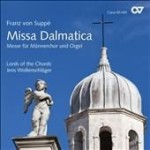What a surprise! Who knew that Viennese composer Franz von Suppé (born in Dalmatia; with family roots in Italy and Belgium; nephew of Donizetti) composed such an attractive liturgical work, so well written for male choir (with a few remarkable solo passages), so appropriate for a church setting yet never too far from the theatrical style that would appeal to the listening populace of 19th-century Vienna. After all, this is the composer of more than two dozen operettas and the famous and oft-performed Light Cavalry and Poet and Peasant overtures. Perhaps most importantly, his Morning, Noon, and Night in Vienna was featured in the Bugs Bunny cartoon “Baton Bunny” (the one where Bugs tries to conduct an orchestra while attempting to swat a bothersome fly–at the end, the only one left around to applaud is the fly).
The original version of this Mass (which has not survived) was completed before Suppé’s venture into the field of operetta, but the published version, which apparently was radically revised, didn’t appear until 40 years later, in 1876. It’s the work of a composer who really knows his craft, who knows how to manage thematic material throughout a substantial work (nearly 50 minutes), and who truly understands voices and how to write sonorous, engaging ensemble music.
Usually I’m not a fan of late-19th-century German (or German-styled) sacred choral music–it tends to be intolerably overwrought–like an organ composition in which the composer feels compelled to employ all of the available stops–but this is definitely an exception. I really loved this piece–there is beautiful melody and harmony and resonant male-voice sound at every turn–although I wonder about the need for such a ridiculously long Gloria (21-plus minutes!), which, perhaps unknown in the history of church music, is longer than the Credo (14 minutes). And there’s a certain amount (thankfully brief) of the “big guitar” plunk-plunk-plunk noodling from the organ in a couple of sections that reminds us that we’re not that far from the dance floor. The good thing is that there is much variety throughout (including some lovely, gorgeously sung solos), and the other movements fall within the more listener-friendly two to four minutes’ length. There were times during the Gloria and Credo when I really wanted to skip ahead, but just then something new and different would be introduced and I knew I didn’t want to miss whatever twist might come next.
Much of the credit for this work’s immediate appeal goes to the “cartoonish”-titled Lords of the Chords (who thinks these things up?), which happens to be an impressive group of absolutely flawless singers (a dozen or so professional choral musicians, who come from all over Germany–and whose model is the King’s Singers), whose blend and balance and sensitivity to the style and richly vibrant harmonic writing would make the work of almost any composer seem like the best thing you’ve ever heard. I’d love to hear these guys live. But for now, I’m pleased to have this eminently repeatable recording of an ingratiating, memorable performance of a remarkable work that, as I mentioned above, is virtually unknown. Well, now we know, and you owe it to yourself to get acquainted.
































